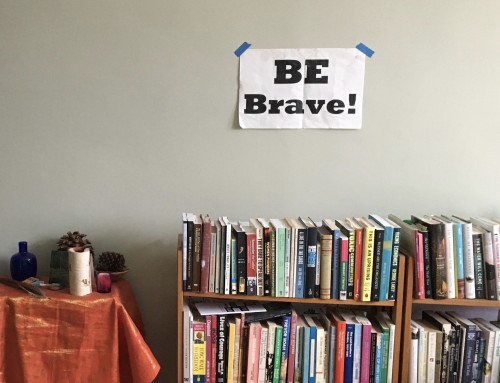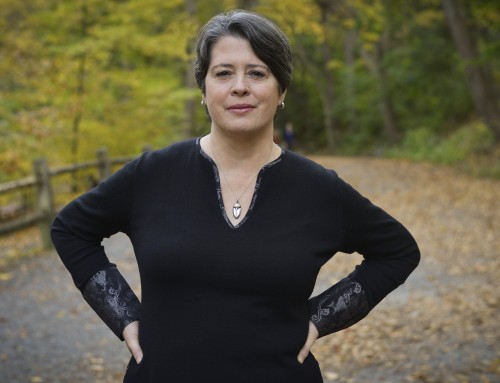My last post drew a number of comments, some of them criticizing my description of Al Gore as courageous. John Comma suggested Quaker peace activist Tom Fox as a better model. I agree. After reading Tom’s last post from Iraq and some of the 92 comments from supporters, I am in tears. Being willing to risk one’s life for others is certainly the most profound kind of courage. Many people have been inspired by his example.
Most of us are so far from Tom’s level of commitment that I still feel a need to find smaller steps that people can take to develop courage. My friend Hilary Beard, whom I interviewed for my book, gave me this idea. She said that she learned in the corporate world that when you want to do something big and scary, you break it down into tiny steps that seem more manageable. In her case, she felt led to leave her corporate career and pursue writing, but even taking a night time writing course seemed frightening. So one day she brought the phone book to work. That wasn’t too scary. The next day she looked up the numbers of colleges that might offer evening writing courses. That wasn’t too scary. The next day she called and asked for catalogs. Every day she took a tiny step, so that now she is supporting herself as a full-time writer, giving people empowering information instead of selling them stuff they don’t need.
Of course there is a difference between acting on one’s own behalf, and acting selflessly, but I am reminded of something Tim O’Brian said in The Things They Carried. Disappointed with himself for not having the courage to oppose the Vietnam War as an adult, he recalled a time when he was cowardly as a child and noted that if you want to develop courage in the big things, you need to start practicing with the little things.
But what about when even a tiny step seems too frightening? Last week I had a conversation with a woman who was irate at the prospect of the president vetoing children’s health care. She approached me and said that because I was “a political person” I should get people to phone the president in protest. I said I agreed with her on the issue and asked whether she had phoned in. She shook her head and laughed in embarrassment. It became clear that, although she felt passionately about the issue, calling a politician to voice her opinion seemed too scary. She wanted someone else to do it.
It would be easy to dismiss her fear as trivial or irrational. After all we are not living in Burma or somewhere where a tiny act of protest could be deadly. John’s comment on my last post was right about many of us living in privilege and relative safety, though I don’t think a lecture on her relative privilege would have helped this person. Frankly, I’m not sure if my encouragement did either, but I’m left with the feeling that many people’s lives are paralyzed by fear, even the privileged. Although part of me wants to say, “Oh, give me a break,” a deeper part of me feels we need to see each other’s fears with compassion, especially if we hope to create a more courageous culture. I remember once feeling judged in college for not being politically conscious enough. I think that judgment, and my defensive reaction to it, delayed my political consciousness by a few years. There has to be a better way to empower people.
I want to uphold the dramatic examples of courage—Tom Fox, Gandhi, Martin Luther King—but I also want to honor the more mundane examples, a woman quitting a lucrative job to follow her calling, or someone speaking up for the first time. Gandhi, after all, was terrified of public speaking. His autobiography is an inspirational account of small changes leading to dramatic transformation.




One of Aun Sang Su Kyi’s most famous sayings is “Fear is a habit.” You could say the same about courage. It has to be learned, practiced, bred in, until it fills the background of our person. We learn it in particular ways, so that we each have a different kind of courage, or a different personal culture of courage. Some kinds may look less courageous than others.
Western culture is bound up in fear. I really saw this after I lived in Central America for a year, a place where people really do have things to fear, yet live more fearlessly. In North America, we tie up our lives with insurance policies, lawsuits, rights, restrictions. We cocoon ourselves in as much security as we can find. But this is like stuffing our ears with cotton fluff — we can’t hear or feel much afterward. This is not really living.
We need to talk more about courage, taking simple risks, living life fully. As long as we live in fear, the power elites can manipulate us.
The quaker expressions for this is “Live up to the Light (courage) that you have, and more will be granted to you.”
Nice post.
Yes!! Nancy A has it right. Courage is a habit, it must be lived, fear must be faced. I agree with her assement of American life, the life manipulated by fear.
Courage is easy if the people round you have it. I believe I read that Tom Fox was a marine(aka.jughead by us army types), one who was trained in bravery and courage. I would expect nothing less from him.
Eileen, I think you are right that the small everyday acts of courage should be acknowlaged and encouragaged. They are the acts that lead ever more meaningful act of courage. I believe the “act” people see as courageous is the end product of overcomming many small fears along the way leading up to the final act. I was a vietnam helicopter pilot and have seen and participated in courageous acts that I havn’t the ability to describe, am I any braver that a girl on the UW campus putting a flower in a gun barrel?
Thank you for opening the dialouge. I only wish I was more articulate and a better speller.
peace
Glenn